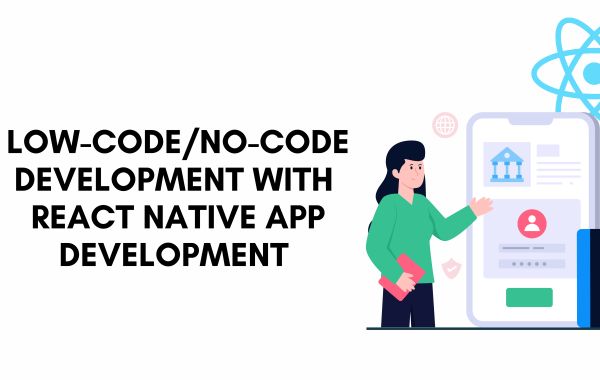The world of mobile app development is constantly evolving. React Native, a framework for building cross-platform apps using JavaScript has emerged as a popular choice due to its efficiency and ability to create native-like experiences. But what if you need more extensive coding expertise? Traditionally, building a React Native app requires strong programming skills. This is where low-code/no-code (LCNC) development comes in, offering a revolutionary approach to React Native app development.
What is React Native App Development?
React Native App Development is a method for building mobile applications (for both iOS and Android) using JavaScript. It utilizes pre-built components written in native languages (Java for Android and Swift/Objective-C for iOS) to render the app's interface, providing a truly native look and feel.
Here's a breakdown of the key points:
- Cross-Platform Development: Build apps for both iOS and Android using a single codebase, saving time and resources compared to developing separate native apps for each platform.
JavaScript Expertise: Leverage your existing JavaScript knowledge to develop mobile apps, reducing the learning curve compared to needing to learn platform-specific languages (Java/Kotlin for Android, Swift/Objective-C for iOS).
Native-like Performance: The use of native components ensures the app feels smooth and responsive, offering a user experience comparable to native apps built with platform-specific languages.
Large Developer Community: React Native benefits from a vast and active developer community that provides ample resources, tutorials, and libraries to support your development process.
React Native is a popular choice for businesses and developers who want to create high-quality mobile applications efficiently.
What is Low-Code/No-Code Development?
LCNC platforms are a new wave of development tools that empower users to create applications with minimal coding or no coding at all. These platforms provide visual interfaces, drag-and-drop functionalities, and pre-built components that simplify the development process.
How Can LCNC Benefit React Native App Development?
LCNC offers numerous advantages for React Native app development, making it more accessible to a wider audience. Here's how:
- Reduced Development Time and Cost: Building apps with LCNC platforms is significantly faster compared to traditional coding. Pre-built components and visual interfaces streamline development, allowing you to launch your app quicker and with lower development costs.
Democratizing App Development: LCNC opens doors for businesses and individuals without a team of experienced developers. With minimal coding required, anyone with a good understanding of the app's functionality can leverage LCNC tools to bring their ideas to life.
Focus on Business Logic: LCNC platforms handle the technical complexities of building user interfaces and functionalities. This allows developers and business owners to focus on core business logic and the unique value proposition of their app.
Improved Collaboration: LCNC tools often facilitate collaboration between business stakeholders, designers, and citizen developers (individuals without formal coding experience). Visual interfaces enable everyone to understand the app's structure and contribute effectively.
Simplified Maintenance and Updates: LCNC platforms often offer built-in functionalities for managing app updates and bug fixes. This simplifies ongoing maintenance, allowing even non-technical users to keep the app up-to-date.
Is LCNC Right for Your React Native App?
While LCNC offers a compelling approach, it's not a one-size-fits-all solution. Here are some factors to consider when deciding if LCNC is suitable for your React Native app:
- App Complexity: LCNC platforms are ideal for building simple to moderately complex apps with well-defined functionalities. For highly complex applications with unique features, traditional coding might be more suitable.
Customization Requirements: While LCNC provides a good degree of customization, it may offer a different level of flexibility than traditional coding for highly customized user interfaces or complex app logic.
Integration Needs: If your app requires integration with a variety of third-party APIs or services, traditional coding might be necessary to achieve the desired level of functionality.
Popular LCNC Platforms for React Native Development
Several LCNC platforms cater specifically to React Native development. Here are a few notable examples:
- Mendix: Offers a user-friendly drag-and-drop interface with pre-built components for building cross-platform mobile apps, including React Native.
OutSystems provides a powerful platform for building enterprise-grade applications, including React Native. It offers a visual development environment and pre-built modules.
Appian is a robust platform for building various applications, including mobile apps with React Native integration. It provides low-code tools and a visual development environment.
Kony AppPlatform: A comprehensive platform for building mobile apps, including React Native development. Kony offers pre-built components and visual development tools.
Getting Started with LCNC for React Native Development
If you've decided to explore LCNC for your React Native app, here's a starting point:
- Evaluate Your Needs: Clearly define the functionalities and features your app requires. This will help you choose an LCNC platform that best suits your project's complexity.
Explore Different Platforms: Research and compare popular LCNC platforms for React Native development. Consider factors like the platform's features, user interface, pricing plans, and available learning resources.
Start with a Trial: Most LCNC platforms offer free trial periods. This allows you to experiment with the platform, build basic prototypes, and assess its suitability for your project.
Leverage Learning Resources: Many LCNC platforms provide extensive learning resources to help you get started. These include tutorials, documentation, code samples, and online communities. Use these resources to learn the platform's functionalities and best practices for React Native development.
Build a Prototype: Once familiar with the platform, start building a basic prototype of your React Native app. This allows you to test the platform's capabilities and refine your app's design and functionalities.
Consider Professional Help: While LCNC platforms are user-friendly, some projects might benefit from professional guidance. Hiring a developer with experience in both LCNC and React Native can be helpful for complex functionalities or customization needs.
The Future of Low-Code/No-Code Development for React Native
LCNC development is rapidly evolving, and its influence on React Native app development is likely to grow. We can expect to see advancements in:
- Improved Functionality and Customization: LCNC platforms will offer more powerful features and greater flexibility for customization, blurring the lines between traditional coding and low-code development.
Enhanced Integration Capabilities: Seamless integration with various third-party APIs and services will become more streamlined within LCNC platforms, empowering developers to build feature-rich applications.
Advanced AI Integration: Integrating artificial intelligence (AI) within LCNC platforms could enable functionalities like intelligent code generation or automated UI design, further simplifying development.
Conclusion
Low-code/no-code development is revolutionizing React Native app development. By offering a user-friendly approach, LCNC platforms are making it possible for a wider range of individuals and businesses to build innovative mobile applications. While LCNC might not be suitable for every project, it presents a compelling option for creating simple to moderately complex React Native apps. As LCNC technology continues to evolve, it's poised to play an even more significant role in the future of mobile app development.
Are you looking to build a React Native app but lack coding expertise? TechnBrains is a promising platform. Consider the factors discussed in this blog to determine if LCNC is the right approach for your project. With careful planning and exploration, you can leverage LCNC to turn your React Native app idea into reality.







